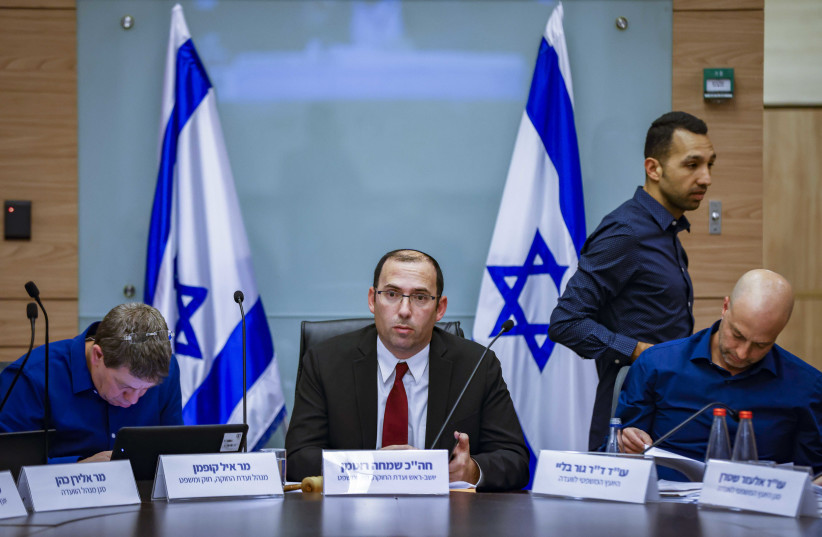The government coalition hardened its judicial reform proposal on the High Court of Justice’s ability to strike down legislation but slightly softened its judicial reform proposals on the Reasonableness Clause and the judge selection committee in a Knesset Constitution Law and Justice Committee session on Wednesday morning.
The changes, presented in the session by committee chairman MK Simcha Rothman (Religious Zionist Party), would require an absolute majority of justices to engage in judicial review and overturn a law alleged to be in contradiction with Israel’s quasi-constitutional Basic Laws. Previous iterations of the reform proposal, held that an 80% majority on the High Court was required to strike a law.
Further, Maariv reported that the Override Clause, which would allow the Knesset to reject the court’s striking of laws with a simple majority, would be able to be enacted preemptively. If voted on by 61 members of Knesset, the legislation would be immune to review by the court.
Judicial review would only be an ability possessed by the High Court. While such a review could be struck down by an Override Clause with a simple Knesset majority, the override would only last up until one year after the enacting Knesset was dissolved.
While Rothman’s new proposal strengthened the coalition’s position on judicial review, the proposal on the selection committee for judges saw the demand for additional politicians on the panel to decrease.

When Justice Minister Yariv Levin announced the judicial reforms two weeks ago, he called to add two additional politicians to the committee, which also has representatives of the High Court and Bar association. The new version would have three Knesset members, three ministers, and three retired judges. While one of the judges would be the High Court president, the others would be retired to prevent a conflict of interest. The change would reduce the majority given to elected officials from seven out of eleven to six out of nine panelists.
Changes to the Reasonableness Clause
The reform’s proposal on the Reasonableness Clause also slightly softened. The update would see the Reasonableness Clause’s inapplicability to decisions by the prime minister or other elected officials only. This wording could allow for the court to intervene in decisions made by appointed civil servants. The Reasonableness Clause is a legal principle that allows the court to intervene in administrative decisions that are determined to be beyond the scope of what a reasonable and responsible authority would engage in.
The Reasonableness Clause is a legal principle that allows the court to intervene in administrative decisions that are determined to be beyond the scope of what a reasonable and responsible authority would engage in.
Respondents have until Thursday morning to submit their comments on the proposal, and Rothman said that debate on The Basic Law: Judiciary reform would continue next week.
However, Government legal adviser Gur Bligh argued that it wasn’t possible to debate the amendment to that Basic Law without taking the entire reform package into account, due to how the reforms complimented one another to give the Knesset and ”political class” more power.
Protests against the reforms are expected to continue this Saturday night.
“The amendment is part of a whole that includes the Judge Selection Committee, the issue of the significant increase and reduction of judicial review, weakening internal audit, weakening the Reasonableness Clause and appointment of minister confidants to legal advisors,” said Bligh. “All these changes are in one direction, a significant reduction in the brakes imposed on the executive branch and the coalition majority in the Knesset.”
“We will do everything possible to increase resistance and to stop the attempt to change the legal system.”
Robes Movement
“We will do everything possible to increase resistance and to stop the attempt to change the legal system,” said the Robes Movement. “We proved our strength in protest last week, and we’ll demonstrate it again together with the rest of our partners in the struggle. We call on all lawyers to come after Shabbat and fight for democracy.”
Rothman said that Bligh’s comments were “a little out of line.”
Labor MK Gilad Kariv said that the Sunday discussion would be held without a legal advisor. Without the advisor’s “expert opinion,” Kariv said “We will not participate in this discussion.”
Former Justice Minister and Likud party member Dan Meridor was present at the session, and spoke against the reforms, calling them “an attempt to ruin a system that developed over 70 years.”
He said that there were some fundamentals beyond reproach, that the current system protected minorities and warned against the rule of the majority.
“You can talk about a faucet or plumbing in the kitchen, but the whole house is about to be destroyed,” said Meridor. “The house will face destruction if these things pass. The members who sit here have a historical responsibility for the history of the Jewish people, for their morals, for the State of Israel, for our children.”
Rothman said he didn’t agree with Meridor’s opinions but said he welcomed the opportunity to hear an opposing view.
Former social equality minister Michal Cohen called for support of protests against the reforms on Saturday night. The protests would continue those held on previous Saturday nights, which have seen tens of thousands of demonstrators march in Tel Aviv.
